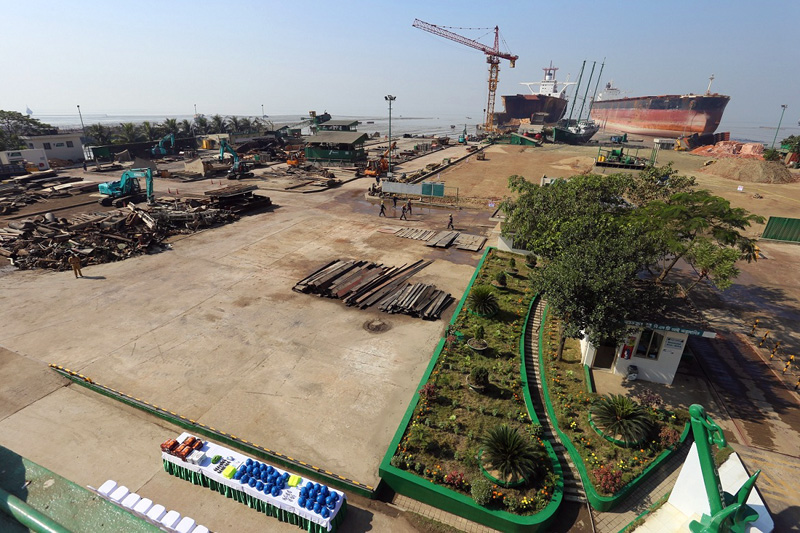Second phase of an IMO-implemented project to enhance safe and environmentally sound ship recycling in Bangladesh launched at stakeholders meeting in Dhaka.

The SENSREC phase II project will focus on building capacity within Bangladesh to develop a legal, policy and institutional reform roadmap towards accession to the Hong Kong International Convention for the Safe and Environmentally Sound Recycling of Ships (known as the Hong Kong Convention), and will train a variety of stakeholders.
The second phase of an IMO-implemented project to enhance safe and environmentally sound ship recycling in Bangladesh has been launched at a meeting of stakeholders in Dhaka, Bangladesh (26 November).
The 19-month project is funded under a US$1.1 million agreement with the Government of Norway. It focuses on building capacity within Bangladesh to develop a legal, policy and institutional reform roadmap towards accession to the Hong Kong International Convention for the Safe and Environmentally Sound Recycling of Ships (known as the Hong Kong Convention), and will train a variety of stakeholders within a well-functioning training system.
The project (click for photos) will build on the first phase of the Safe and Environmentally Sound Ship Recycling in Bangladesh (SENSREC) Project, which resulted in economic and environmental studies on ship recycling in Bangladesh, the development of training materials and capacity building plans and a preliminary design for infrastructure including facilities for treatment, storage and disposing of hazardous wastes generated from recycling operations.
Speaking at the Dhaka meeting, Her Excellency Ms Sidsel Bleken, Ambassador of Norway to Bangladesh, highlighted the significant progress made and their support for phase II of the project.
“The first phase of the project has achieved significant progresses in terms of developing health, safety and environmental standards as well as developing appropriate training programs for the industry stakeholders including its workers. Norway is pleased to launch phase II of the project and to continue supporting Bangladesh on its road to compliance with the Hong Kong Convention. The Government of Bangladesh, the ship recycling industry as well as the international ship-owners, have a joint responsibility in making this happen.”
Bangladesh is one the world’s top five ship recycling countries by capacity, alongside China, India, Pakistan and Turkey. Together they accounted for 98% of known ship recycling in the world*. Ship recycling is key for the local economy and produces large quantities of steel and other materials which are recycled and sold on.
Bangladesh ship recycling - SENSREC Phase II Project
The SENSREC Phase II Project will continue to support Bangladesh to comply with international requirements and guide Bangladesh towards accession to the IMO ship recycling treaty, namely the Hong Kong Convention.
The Hong Kong Convention sets the international standards for ship recycling and, when in force, will ensure that ships do not pose any unnecessary risks to human health, safety or the environment when being recycled at the end of their operational lives.
Bangladesh will be assisted to build the capacity to develop and implement a legal, policy and institutional roadmap towards accession to the Hong Kong Convention. A variety of stakeholders will be trained within a well-functioning training system to lay the foundation for an effective and sustainable training programme for the ship recycling sector in Bangladesh.
Two core work packages form the basis of the project. The first focuses on building the national capacities to prepare for accession to the Hong Kong Convention, through three interconnecting activities: assessing the present situation; exploring current best practices in other ship recycling countries; and identifying recommendations and a roadmap to guide the Government of Bangladesh towards accession to the Hong Kong Convention.
The second work package will deliver targeted pilot training activities in line with the Hong Kong Convention requirements, establishing a robust training management and governance system and delivering training activities developed for various stakeholders and workforces. Two training workshops will address waste management issues. These will be supported by the Secretariat of Basel, Rotterdam and Stockholm Conventions (BRS), the treaties which aim to protect human health and the environment from hazardous chemicals and wastes.
IMO is acting as the implementing and executing agency for the project, working closely with the Ministry of Industries of the Government of the People’s Republic of Bangladesh as the national executing partner.
The project is funded by Norway’s Ministry of Foreign Affairs, channelling finance through the Embassy of Norway to Bangladesh. The budget is 9.0 million Norwegian Krone (approximately US$1.1 million), for the 19-month project. The agreement between IMO and Norway on funding support was signed on 24 November 2017.
Other international partners include the Secretariat of the BRS Conventions, the International Labour Organization (ILO) and the United Nations Industrial Development Organization (UNIDO).
___________
* Calculation of Recycling Capacity for Meeting the Entry-into-Force Conditions of the Hong Kong Convention (MEPC 73/INF.2)
